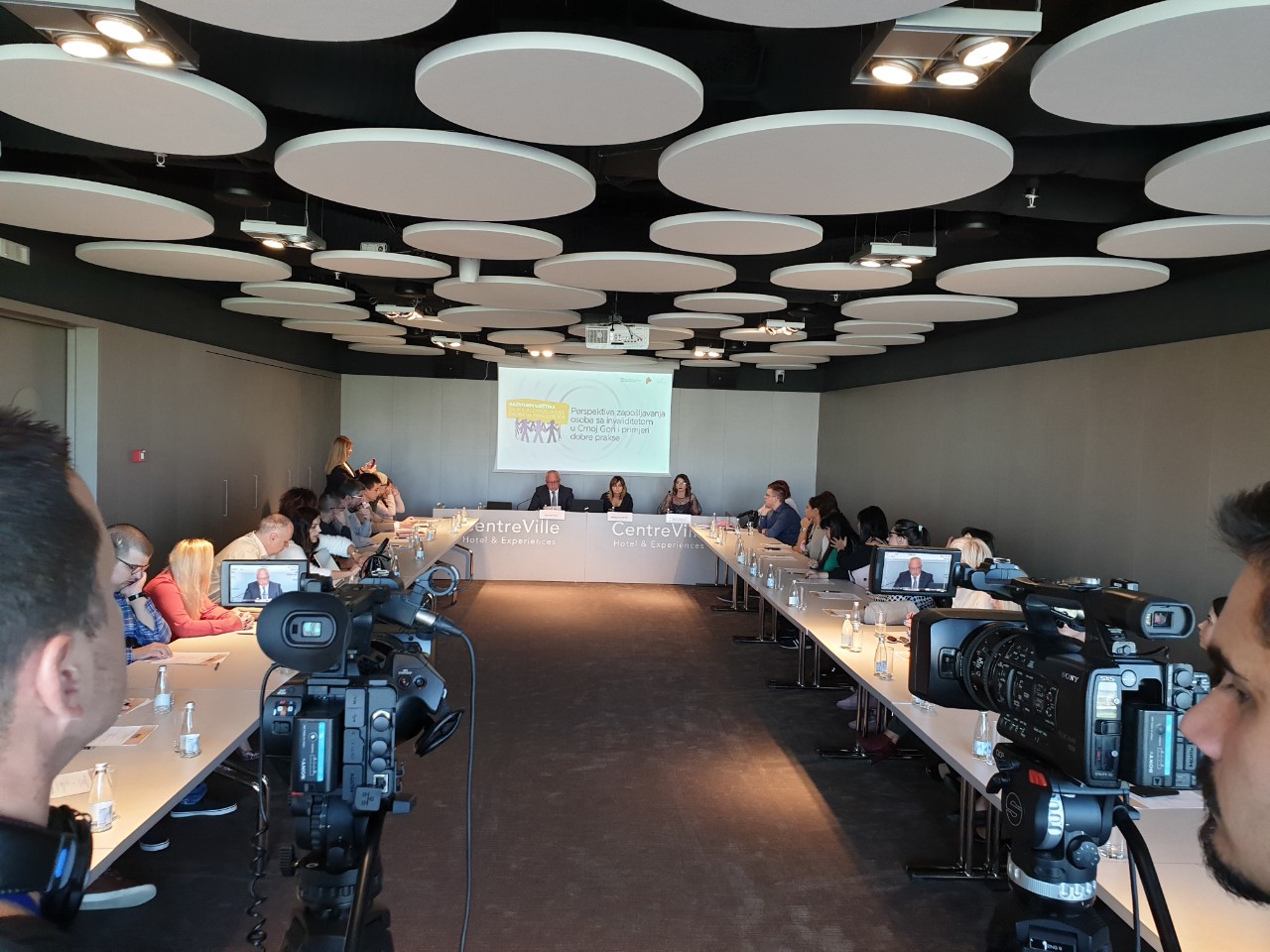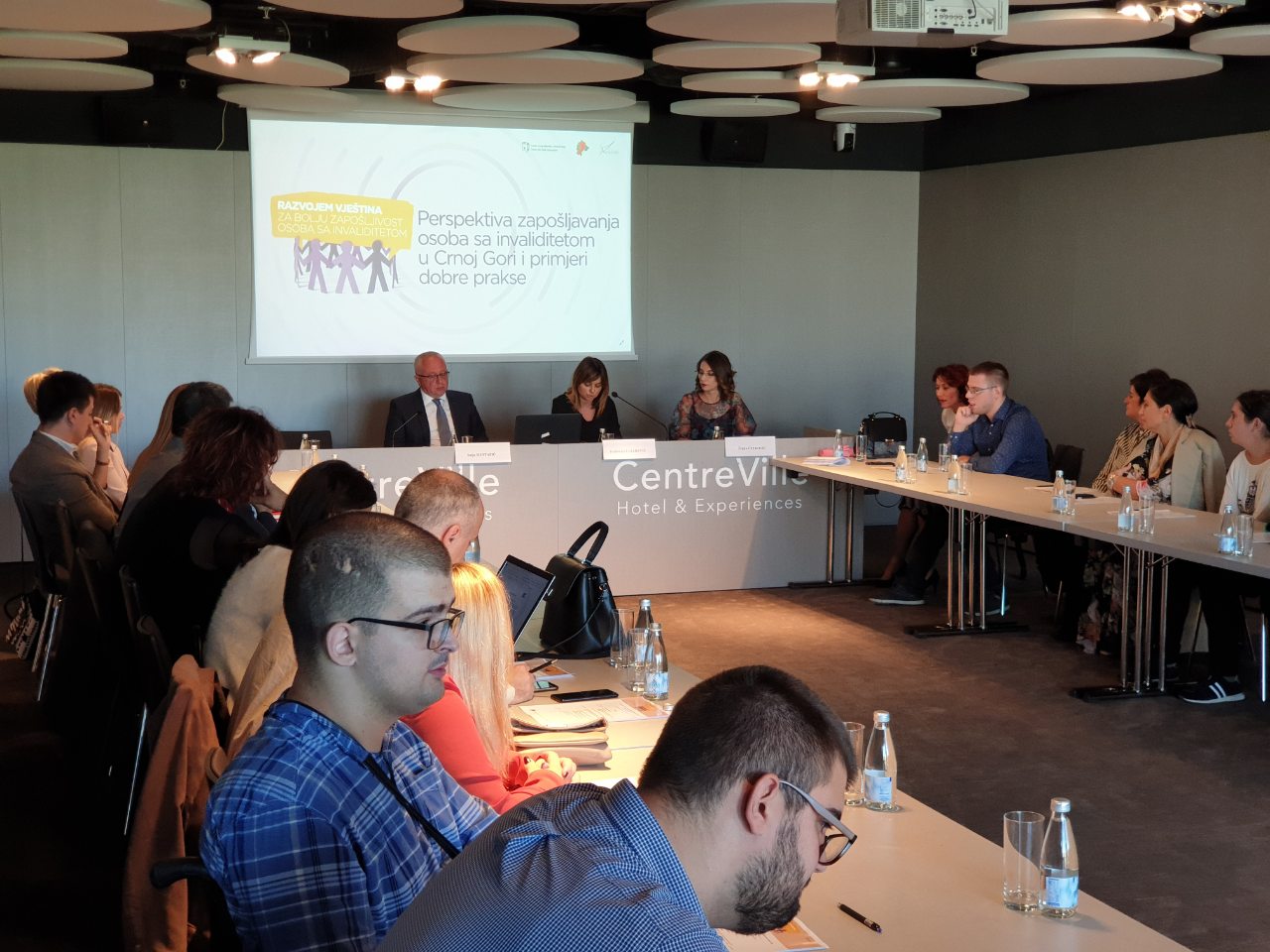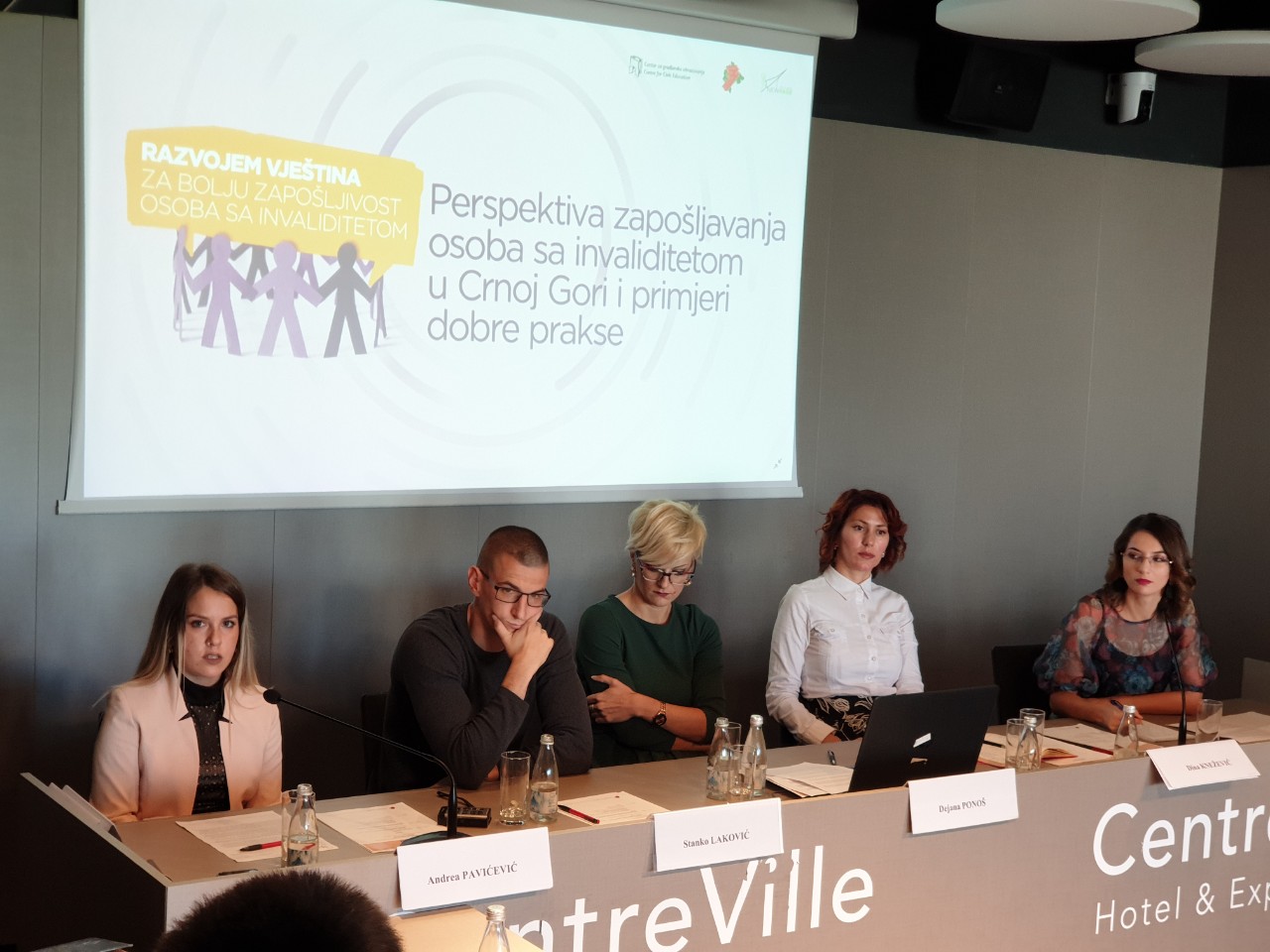‘People with disabilities can be creators of great and important stories if given the opportunity, they should be accepted individually, according to their personal qualities and willingness to face workplace challenges,’ as it was assessed at the conference ‘Perspectives of employment of persons with disabilities in Montenegro and Examples of Good Practice’ which was final activity of the project ‘Developing skills for better employability of persons with disabilities’, organized by the Centre for Civic Education (CCE) and supported by the Employment Agency of Montenegro.
Suljo Mustafic, Director of the Employment Agency of Montenegro, assessed that the project implemented by the CCE with the support of the Employment Agency contributes to greater involvement of vulnerable groups into Montenegrin society and emphasized that the Employment Agency and the CCE have successful and long-lasting cooperation. ‘Given that NGO sector is an important actor both in the fight against discrimination and the employment sphere, I believe that the success of our work is measured by openness to the initiatives they have addressed,’ Mustafic claimed. He pointed to numerous Agency’s programmes aimed at solving unemployment of persons with disabilities, but also reducing prejudices of employers and general public when it comes to the employment of persons with disabilities. ‘Grant schemes and public calls for grants have significantly contributed to improving the employment of persons with disabilities. Since 2014, when the first public call was announced, until this year, the Agency has conducted eight public calls worth 13.5 million euros. These projects involved over 1000 persons with disabilities, out of whom almost 40% continued their working engagement after completion of the project. In Montenegro, there are 660 employers who exercise right to subventions on salary because they have employed 1012 persons with disabilities,’ he stated and called on all legal entities to contribute to inclusion of persons with disabilities in the labour market thought their ideas.
Daliborka Uljarevic, CCE Executive Director, emphasized that persons with disabilities remain at the top of the discrimination scale in the Montenegrin society, which is why much work is necessary to make our society tolerant and inclusive. ‘Unemployment is both the cause and the consequence of any further discrimination and marginalization of persons with disabilities, which consequently harms both this group and society as a whole, due to the fact that huge potentials remain unused as a lever for social and economic development,’ assessed Uljarevic. In her reflection to the project goals, she especially thanked to the organizations, institutions and companies that demonstrated openness to cooperate and in which the project beneficiaries had their working practice – NGO CAZAS, NGO Green Home, Paraplegic Association from Niksic, Centre for Investigative Journalism of Montenegro, Arhimed LLC, ‘Moja knjiga’ LCC, New Page LCC, Agency for Personal Data Protection and Free Access to Information and Institution of Protector of Human Rights and Freedoms of Montenegro. ‘We thank them for providing an example of good employment practice of persons with disabilities, hoping that many other employers will follow this example and thus contribute to the inclusion of persons with disabilities in Montenegrin society,’ Uljarevic concluded.
Dina Knezevic, Advisor at Protector of Human Rights and Freedoms of Montenegro (Ombudsman) in charge for discrimination issues, highlighted her good experience with a project beneficiary who worked at the Ombudsman’s institution. ‘The project whose focus are persons with disabilities, as one of the most vulnerable categories of the population, that face prejudice, stereotypes and discrimination in every form and in all areas of life, has great importance. It is also concerning that more than 60% of persons with disabilities live in poverty, as well as the fact that they are the most discriminated group among all marginalized groups,’ said Knezevic. She also presented the Ombudsman’s competencies related to protection against discrimination of persons with disabilities. ‘Regarding complaints procedures to the Ombudsman’s institution, we have growing trend of complaints, therefore, in 2018 were recorded 17 complaints on the basis of disability and 6 on the basis of health status that can be viewed from the aspect of disability as well, while in previous years that number ranged from 5 up to 7 complaints. This indicates increased visibility of the Ombudsman’s institution, but also increased awareness of persons with disabilities and organizations dealing with these issues,’ stated Knezevic. She also pointed to the need to systematize workplaces for persons with disabilities in the acts of legal entities and recalled that the rights of persons with disabilities are frequently in the focus of the Ombudsman.
Stanko Lakovic, Independent Advisor III at the Fund for Professional Rehabilitation and Employment of Persons with disabilities, emphasized the multiple effects of the CCE project, including various subjects and objects, as well as raising awareness of the public and employers on the employment opportunities and benefits of persons with disabilities. ‘The employment benefits of persons with disabilities are defined in Article 36 of the Law on professional rehabilitation and employment of persons with disabilities. It provides subventions on salary, grants for workplace adjustment and working conditions for persons with disabilities, participation in financing the personal expenses of workplace personal assistant of persons with disabilities, as well as loans under favourable conditions for the purchase of machines and tools for persons with disabilities. Hence, subventions as facilitation and incentive measure exist,’ Lakovic explained. He also reflected upon results, stating that at the end of 2014, there were about 90 employers who exercised their right to subventions on salary. ‘Now we have 660 employers. We have processed over 890 applications for subventions on salary, awarded over 30 grants for workplace adjustments and working conditions, and now over 60 employers exercise right to subventions on salary. In these five years, considerable progress has been made in this area,’ he added. Lakovic emphasized the necessity of establishing criteria when employing persons with and without disabilities, the need to adapt workplaces of persons with disabilities with their abilities and education, and breaking employers’ prejudices towards working abilities of persons with disabilities.
Dejana Ponos, Director of Arhimed LLC, spoke about examples of good employment practices and shared Arhimed’s experience in hiring people with disabilities. ‘We had good will when applying and we were open for learning, which has proven to be crucial to achieve success in this kind of cooperation, both in our company and with persons with disabilities themselves.’ She explained that it was process, which was conducted through gradual inclusion of persons with disabilities – from several hours to full-time work. In parallel, they learned IT skills, company culture and habits of employees with disabilities, on one hand, while the time spent together and jokes were additional motivation for good cooperation, on the other. ‘Everyone benefited from this project – both employees with disabilities who developed social and work skills as well as other employees because they learned patience, accepting diversity in every way, empathy, adapting, which was also shown by a survey among Arhimed employees,’ she stated. She further explained that the goal of every company is to find loyal and hard-working people, and that inclusion of persons with disabilities into society and work tasks, not only in the projects, must become a goal. ‘Duty of all employers is to find the adequate job for the right person whom we will not qualify as disabled person but as an equal member of the team,’ she concluded.
Andrea Pavicevic, the project beneficiary, talked about her experience through the CCE project and capacity building within organized intensive two-month training. ‘Acquired knowledge was very useful and I apply it in my new workplace. I think this project was challenging for both employers and project beneficiaries. In Montenegro, awareness of the rights of persons with disabilities is still undeveloped, despite the fact that they can be, in accordance with their capabilities, i.e. the type of disability, useful workforce and that they can leave their mark on different processes,’ Rogosic said. She emphasized that much depends on the attitude towards persons with disabilities, bearing in mind that they constantly face misunderstanding, discrimination and disrespect, which also stimulates employers’ scepticism about the abilities of persons with disabilities to carry out work tasks. ‘In order to reach a common goal, it is essential that persons with disabilities enjoy their fundamental rights and freedoms, and for employers to be open to cooperation. People with disabilities can be creators of great and important stories if given the opportunity, they should be accepted individually, according to their personal qualities and willingness to face workplace challenges’, she concluded.
The conference gathered together around 45 participants – persons with disabilities, representatives of employers’ associations, unions, non-governmental organizations and Government, who after the opening remarks had an interesting discussion.
Maja Marinović, CCE project assistant



